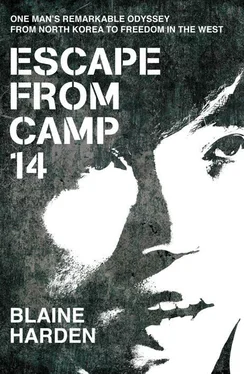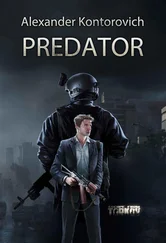While Shin remained wary of me, he responded to every question about his past that I could think of. His life can seem incredible, but it echoes the experiences of other former prisoners in the camps, as well as the accounts of former camp guards.
‘Everything Shin has said is consistent with what I have heard about the camps,’ said David Hawk, a human rights specialist who has interviewed Shin and more than two dozen other former labour camp prisoners for ‘The Hidden Gulag: Exposing North Korea’s Prison Camps’, a report that links survivor accounts with annotated satellite images. It was first published in 2003 by the US Committee for Human Rights in North Korea and has been updated as more testimony and higher-resolution satellite images became available. Hawk told me that because Shin was born and raised in a camp, he knows things that other camp survivors do not. Shin’s story has also been vetted by the authors of the Korean Bar Association’s ‘White Paper on Human Rights in North Korea’. They conducted extensive interviews with Shin, as well as with other known camp survivors who were willing to talk. As Hawk has written, the only way for North Korea to ‘refute, contradict, or invalidate’ the testimony of Shin and other camp survivors would be to permit outside experts to visit the camps. Otherwise, Hawk declares, their testimony stands.
If North Korea does collapse, Shin may be correct in predicting that its leaders, fearing war crimes trials, will demolish the camps before investigators can get to them. As Kim Jong Il explained, ‘We must envelope our environment in a dense fog to prevent our enemies from learning anything about us.’ [6] Hyun-sik Kim and Kwang-ju Son, Documentary Kim Jong Il (Seoul: Chonji Media, 1997), 202, as cited in Ralph Hassig and Kongdan Oh, The Hidden People of North Korea (Lanham, MD: Rowman & Littlefield, 2009), 27.
To try to piece together what I could not see, I spent the better part of three years reporting about North Korea’s military, leadership, economy, food shortages and human rights abuses. I interviewed scores of North Korean defectors, including three former inmates of Camp 15 and a former camp guard and driver who worked at four labour camps. I spoke to South Korean scholars and technocrats who travel regularly inside North Korea, and I reviewed the growing body of scholarly research on and personal memoirs about the camps. In the United States, I conducted extended interviews with Korean Americans who have become Shin’s closest friends.
In assessing Shin’s story, one should keep in mind that many others in the camps have endured similar or worse hardships. According to An Myeong Chul, a former camp guard and driver, ‘Shin had a relatively comfortable life by the standards of other children in the camps.’
By exploding nuclear bombs, attacking South Korea and cultivating a reputation for hair-trigger belligerence, the government of North Korea has stirred up a semi-permanent security emergency on the Korean Peninsula.
When North Korea deigns to enter into international diplomacy, it has always succeeded in shoving human rights off the negotiating table. Crisis management, usually focused on nuclear weapons and missiles, has dominated American dealings with the North.
The labour camps have been an afterthought.
‘Talking to them about the camps is something that has not been possible,’ David Straub, who worked in the State Department during the Clinton and Bush years as a senior official responsible for North Korea policy, told me. ‘They go nuts when you talk about it.’
The camps have barely pricked the world’s collective conscience. In the United States, newspaper stories notwithstanding, ignorance of their existence remains widespread. For several years in Washington, a handful of North Korean defectors and camp survivors gathered each spring on the Mall for speeches and marches. The Washington press corps paid little attention. Part of the reason was language. Most of the defectors spoke only Korean. As important, in a media culture that feeds on celebrity, no movie star, pop idol or Nobel Prize winner stepped forward to demand that outsiders invest emotionally in a distant issue that lacks good video footage.
‘Tibetans have the Dalai Lama and Richard Gere, Burmese have Aung San Suu Kyi, Darfurians have Mia Farrow and George Clooney,’ Suzanne Scholte, a long-time activist who brought camp survivors to Washington, told me. ‘North Koreans have no one like that.’
Shin told me he does not deserve to speak for the tens of thousands still in the camps. He is ashamed of what he did to survive and escape. He has resisted learning English, in part because he does not want to have to tell his story again and again in a language that might make him important. But he desperately wants the world to understand what North Korea has tried so diligently to hide. His burden is a heavy one. No one else born and raised in the camps has escaped to explain what went on inside — what still goes on inside.
Shin and his mother lived in the best prisoner quarters Camp 14 had to offer: a ‘model village’ next to an orchard and just across from the field where his mother was later hanged.
Each of the forty one-storey buildings in the village housed four families. Shin and his mother had their own room, where they slept side by side on a concrete floor. The four families shared a common kitchen, which had a single bare light bulb. Electricity ran for two hours a day, from four to five in the morning and ten to eleven at night. Windows were made of grey vinyl too opaque to see through. Rooms were heated in the Korean way by a coal fire in the kitchen with flues running under the bedroom floor. The camp had its own coal mines and coal for heating was readily available.
There were no beds, chairs or tables. There was no running water. No bath or shower. Prisoners who wanted to bathe sometimes sneaked down to the river in the summer. About thirty families shared a well for drinking water. They also shared a privy, which was divided in half for men and women. Defecating and urinating there was mandatory, as human waste was used as fertilizer on the camp farm.
If Shin’s mother met her daily work quota, she could bring home food for that night and the following day. At four in the morning, she would prepare breakfast and lunch for her son and for herself. Every meal was the same: corn porridge, pickled cabbage and cabbage soup. Shin ate this meal nearly every day for twenty-three years, unless he was denied food as punishment.
When he was still too young for school, his mother often left him alone in the house in the morning, and came back from the fields at midday for lunch. Shin was always hungry and he would eat his lunch as soon as his mother left for work in the morning.
He also ate her lunch.
When she came back at midday and found nothing to eat, she would become furious and beat her son with a hoe, a shovel, anything that was close at hand. Some of the beatings were as violent as those he later received from the guards.
Still, Shin took as much food as he could from his mother as often as he could. It did not occur to him that if he ate her lunch she would go hungry. Many years later, after she was dead and he was living in the United States, he would tell me that he loved his mother. But that was in retrospect. That was after he had learned that a civilized child should love his mother. When he was in the camp — depending upon her for all his meals, stealing her food, enduring her beatings — he saw her as competition for survival.
Her name was Jang Hye Gyung. Shin remembers her as small and slightly plump with powerful arms. She wore her hair cut short, like all women in the camp, and was required to cover her head with a white cloth folded into a triangle that tied around the back of her neck. Shin discovered her birth date — 1 October 1950 — from a document he saw during his interrogation in the underground prison.
Читать дальше












